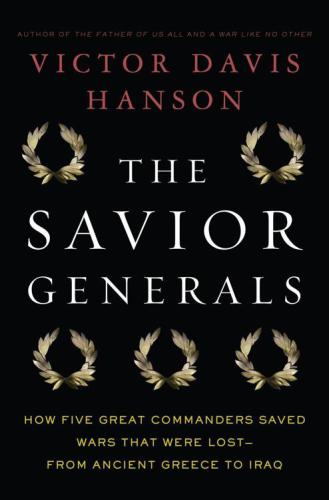
The Savior Generals
How Five Great Commanders Saved Wars That Were Lost--From Ancient Greece to Iraq
کتاب های مرتبط
- اطلاعات
- نقد و بررسی
- دیدگاه کاربران
نقد و بررسی

March 25, 2013
Hanson (Makers of Ancient Strategy) begins with a deceptively simple question: “How are wars won or lost?” He cites familiar answers—technology, numbers, contingency—but he asserts that in desperate situations, human leadership still matters. To make his case, Hanson profiles five “savior generals” drawn from 2,500 years of conflict. Themistocles’s leadership was “multifaceted,” his career checkered; but his foresight preserved Greek freedom and its concepts of democracy, rationalism, and individual rights. Belisarius served a Byzantium on the edge of collapse, and established a strategic blueprint that for nearly a millennium held Western advances at bay. Sherman’s 1864 campaign was a masterpiece of “planning and organization” in service of a war whose success ensured Lincoln’s reelection and preserved the Union. Matthew Ridgway took over an unstable army and in 100 days saved South Korea and left an “indelible impression” on China regarding the risks of military confrontation with the U.S. Finally, David Petraeus designed and masterminded a “surge” that “saved a war deemed lost by almost everyone around him.” Hanson accurately describes these men as a “rare breed” of “mavericks and loners.” From Athens to Iraq, they seized their moments and reshaped history. Agent: Glen Hartley and Lynn Chu, Writers Representatives, LLC.

March 15, 2013
An instructive series of portraits of five military outsiders called in to turn defeat into victory. Admittedly arbitrary, pro-Western and biased toward fighters of the "good" wars, these minibiographies by accomplished military historian Hanson (Obama: The Dream and the Reality, 2012, etc.) jump rather jarringly from the ancient world (Themistocles at Salamis 480 B.C.) to the American Civil War (William Tecumseh Sherman marching on Atlanta), without much in between. In all of the struggles, Hanson spotlights the unglamorous backgrounds of these generals, called in when the more upper-echelon leaders had failed; they were able to inspire the rank and file, think "outside of the box" and display unusual cool-headed mettle. Moreover, in retirement, they were often misunderstood, ill-appreciated and even abused. Hanson calls them "fireman," leaders "asked to extinguish the conflagration that others, of typically superior rank and prestige, have ignited." For example, in the panic to abandon Athens to the invading Persian King Xerxes, the Athenian lowborn general Themistocles stood like Charles de Gaulle against the invading Germans, as the author compares him, without any legitimacy but fighting words and a cunning plan to make a stand at Salamis despite an overwhelming Persian naval force. In 100 days, Matthew Ridgway, called into Korea in December 1950 after the sudden death of Gen. Walton Walker, turned around the defeatist mentality of the American troops, securing Seoul from the Chinese and North Koreans, restoring the 38th Parallel and convincing his bosses not to penetrate further into Korea. Gen. David Petraeus, too, was able to take a losing scenario in Iraq and employ a counterinsurgency success. However, resentment often hounded the generals in later years. A highly selective chronicle of elaborate eleventh-hour heroics by unconventional thinkers and men of action.
COPYRIGHT(2013) Kirkus Reviews, ALL RIGHTS RESERVED.

























دیدگاه کاربران